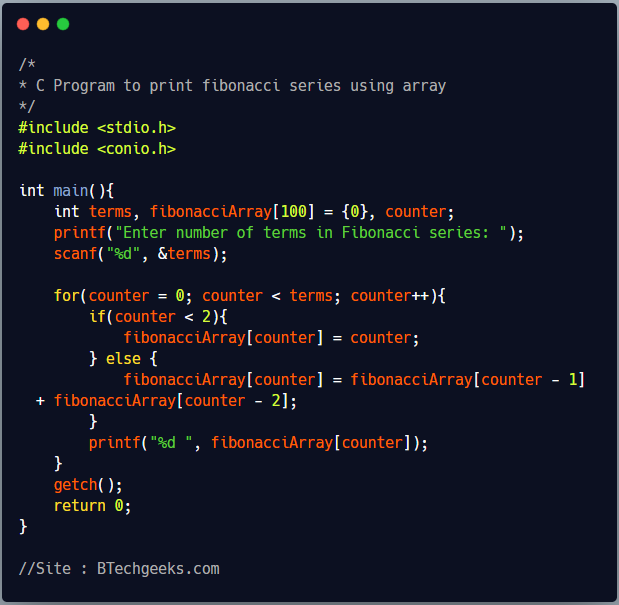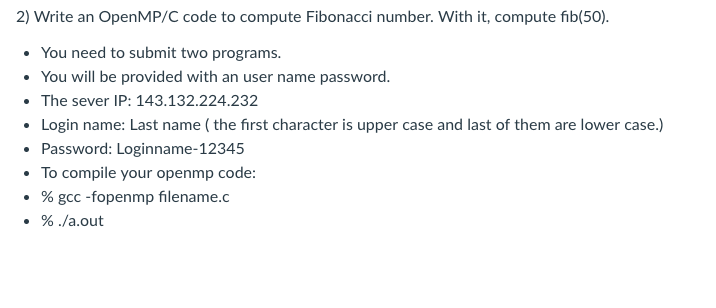

- OPENMP FIBONACCI SERIES C PROGRAM HOW TO
- OPENMP FIBONACCI SERIES C PROGRAM SERIAL
- OPENMP FIBONACCI SERIES C PROGRAM MANUAL
- OPENMP FIBONACCI SERIES C PROGRAM CODE
(idb) b 6īreakpoint 1 at 0x804898e: file /fib.C, line 6. The OpenMP functions are included in a header file called omp.h. The following output illustrates the type of information that idb info task displays.

Consider the following source code: 1 #include
OPENMP FIBONACCI SERIES C PROGRAM SERIAL
Here is how I attempted it, and after input size of 20 parallel version runs a bit faster than serial (like in 70-80% time).The program being debugged in this example calculates the 5th Fibonacci number by spawning tasks to calculate the previous two numbers recursively. To understand this example, you should have the knowledge of the following C programming topics: C Programming Operators C while and do. I still believe there should be a way to do this (if somebody know, kindly let me know). C Program to Display Fibonacci Sequence In this example, you will learn to display the Fibonacci sequence of first n numbers (entered by the user). So I have to manually specify after which level not to create more tasks.
OPENMP FIBONACCI SERIES C PROGRAM HOW TO
I believe I do not know how to tell the compiler not to create parallel task after a certain depth as: omp_set_max_active_levels seems to have no effect and omp_set_nested is deprecated (though it also has no effect).
OPENMP FIBONACCI SERIES C PROGRAM CODE
The following code is for test purposes for the OP to test #define CUTOFF 5

There need to be 2 versions of the function and when the thread goes too deep, it continues the recursion with single threading.ĮDIT: cutoff variable needs to be increased before entering OMP zone. processor with that of a serial C program and dividing by the number of tasks.
OPENMP FIBONACCI SERIES C PROGRAM MANUAL
In this OpenMP/Tasks wiki page, it is mentioned and a manual cut off is suggested. stealing and the Barcelona OpenMP Tasks Suite for characterizing ap. If your codes try to create too many threads, mostly by recursive methods, this may cause a delay to all running threads causing a massive set back. the operating system to determine the number of cores on the system and use. If not specified, Intel Cilk Plus will query. This program takes a single parameter to specify the number of workers to. There is also another bottleneck for threading. This application demonstrates the use of the cilkspawn. multi-platform shared-memory multiprocessing programming in C, C++, and Fortran, on many platform. Multi-threading shows increase in speed if the job normally takes time longer than second, not milliseconds. Program-1: Program to print Fibonacci series. For smaller jobs, which is done very fast on a single core, threading slows the job down because of this. OpenMP code is closer to serial code one. In multi-threading, it takes some time to initialize work on CPU cores. It releases programmers from complicated multi-thread APIs and helps them develop high-performance parallel programs.
I was hoping someone with OpenMP experience could take a look at this code and help me to obtain the ultimate speed / parallelization for this: includeStd::cout << "Time(ms): " << time*1000 << std::endl I have tried to write an example code in C++ in visual studio 2012 to implement matrix multiplication. If (n < 20) //EDITED CODE TO INCLUDE CUTOFFĭouble time = omp_get_wtime() - start_time Do people get better speed when running the below on 4 threads than on 1 thread? I'm getting a 10 times slowdown when running on 4 cores (I should be getting moderate speedup rather than significant slowdown).

The following code is actually based on a similar question: OpenMP recursive tasks but when trying to implement one of the suggested answers, I don't get the intended speedup, which suggests I've done something wrong (and not sure what it is). I'm trying to understand why the following runs much faster on 1 thread than on 4 threads on OpenMP.


 0 kommentar(er)
0 kommentar(er)
